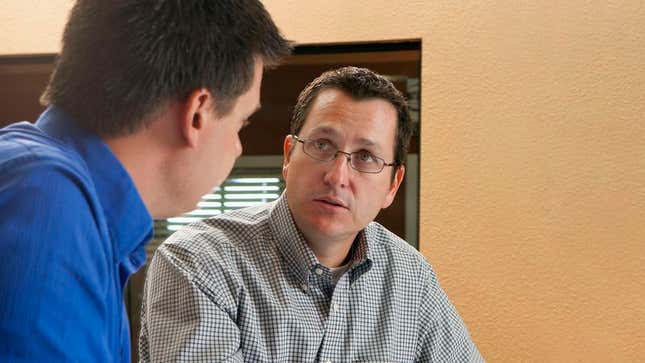
SEATTLE—As debate continues in Washington over the funding of President Obama’s health care initiative, sources confirmed Thursday that 39-year-old Daniel Seaver, a man who understands a total of 8 percent of the Affordable Care Act, offered a vehement defense of the legislation to 41-year-old Alex Crawford, who understands 5 percent of it.
“First of all, Obamacare will reduce insurance premiums for most people, and no one can be denied coverage if they have preexisting conditions and stuff like that,” said Seaver, displaying over half of his 8 percent grasp on the sweeping health care reform policy. “Which means a whole bunch of uninsured Americans—I’m talking millions of people here—will finally have access to health care. How can you not get behind that?”
“And Medicare has nothing to do with this, by the way—that’s a separate thing,” continued Seaver, adding one of the few remaining facts he knows about Obamacare. “This just deals with the private insurance companies and makes sure they can’t, you know, drive up costs through the roof.”
According to reports, Seaver mounted an impressive case given his severely limited knowledge of the actual law itself, bolstering his 8 percent understanding of the Affordable Care Act with his 6 percent awareness of the nation’s current economic landscape. Crawford, meanwhile, demonstrated just about the full extent of his understanding of Obamacare by claiming that its provisions could potentially kill jobs.
Sources confirmed that, if asked, neither man would actually be able to correctly define the term “HMO” or coherently explain what a health care exchange actually is and how such a thing would actually work on a regional basis.
“If you get insurance through your job, you can keep it, so this won’t affect a lot of people,” said Seaver, failing to incorporate roughly 90 percent of the bill’s actual groundwork into his semi-accurate assertion. “It’ll really only change things for really poor people who live below the poverty line. That’s it.”
“Saying this is somehow a government takeover of the healthcare industry is, quite frankly, a flat-out lie,” added Seaver, forcefully and passionately summarizing what he remembers from an informed person’s opinion he read on a website recently. “All this does is offer a public option.”
Over the course of the next half hour, the two men used their full comprehension of what reportedly amounts to several sentences at best of the Affordable Care Act to debate many facets of the 906-page piece of legislation. On separate occasions, sources said Seaver and Crawford both claimed to have done “a lot of research” on the subject.
“Okay, I hear your points, but I think there are a lot of other factors to consider,” said Crawford, boldly countering Seaver’s 8 percent knowledge of the subject with his own 5 percent familiarity with it. “It’s actually going to raise insurance costs for most people. The way it actually works is, see, there are different tiers. And these different tiers, or levels or whatever, have different co-payments. And then there’s the individual mandate, which means you’re required by law to get insurance, otherwise you pay higher taxes. So, you see, there are all these other things to think about.”
“Are you starting to get it?” Crawford added, after almost completely emptying his accumulated knowledge on the subject in one fell swoop. “It’s complicated, for sure.”
The two men, whose collective net understanding reportedly makes up, in a generous estimate, little more than one one-tenth of the entire Affordable Care Act, then repeatedly volleyed back and forth over the constitutionality of the law—a matter that sources confirmed they have a roughly 0.000001 percent knowledge of.
Sources also confirmed that the two men independently opted not to introduce at all the subjects of prescription drugs, the Federal Employees Health Benefits Program, the law’s effect on small business owners, exemptions, state costs, specific penalties for opting out, effects on the marketplace, the nation’s existing overall quality of health care, any specific statistic whatsoever, and the federal budget.
“Hold on, Alex, let’s go back to the premiums for a second, because I feel like I need to drive this point home for you: they’ll get lower for most people,” said Seaver, straining the very limits of his 8 percent comprehension of the bill to the point of utter collapse. “Lower premiums, lower deductibles, and no denial of coverage to people with preexisting conditions.”
“Way lower premiums,” Seaver added.
At press time, both men’s understanding of Obamacare had dropped to 3 percent as a result of the debate.